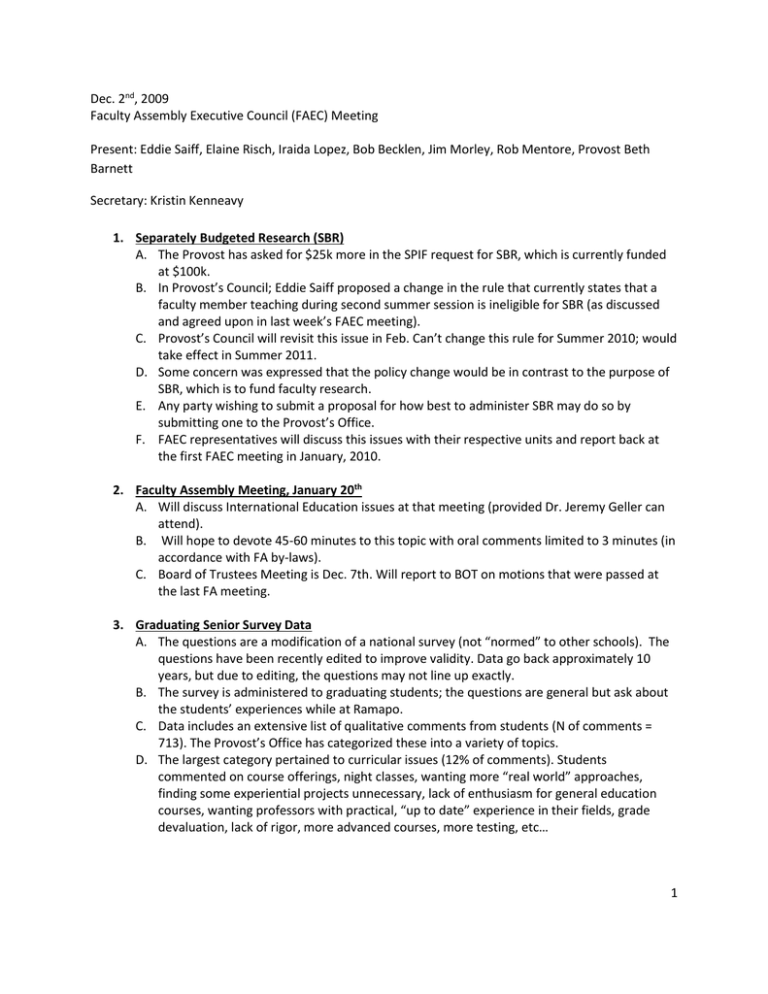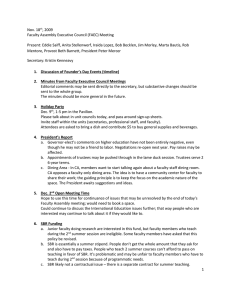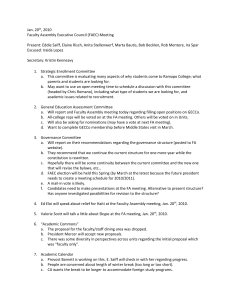Dec. 2 , 2009 Faculty Assembly Executive Council (FAEC) Meeting
advertisement

Dec. 2nd, 2009 Faculty Assembly Executive Council (FAEC) Meeting Present: Eddie Saiff, Elaine Risch, Iraida Lopez, Bob Becklen, Jim Morley, Rob Mentore, Provost Beth Barnett Secretary: Kristin Kenneavy 1. Separately Budgeted Research (SBR) A. The Provost has asked for $25k more in the SPIF request for SBR, which is currently funded at $100k. B. In Provost’s Council; Eddie Saiff proposed a change in the rule that currently states that a faculty member teaching during second summer session is ineligible for SBR (as discussed and agreed upon in last week’s FAEC meeting). C. Provost’s Council will revisit this issue in Feb. Can’t change this rule for Summer 2010; would take effect in Summer 2011. D. Some concern was expressed that the policy change would be in contrast to the purpose of SBR, which is to fund faculty research. E. Any party wishing to submit a proposal for how best to administer SBR may do so by submitting one to the Provost’s Office. F. FAEC representatives will discuss this issues with their respective units and report back at the first FAEC meeting in January, 2010. 2. Faculty Assembly Meeting, January 20th A. Will discuss International Education issues at that meeting (provided Dr. Jeremy Geller can attend). B. Will hope to devote 45-60 minutes to this topic with oral comments limited to 3 minutes (in accordance with FA by-laws). C. Board of Trustees Meeting is Dec. 7th. Will report to BOT on motions that were passed at the last FA meeting. 3. Graduating Senior Survey Data A. The questions are a modification of a national survey (not “normed” to other schools). The questions have been recently edited to improve validity. Data go back approximately 10 years, but due to editing, the questions may not line up exactly. B. The survey is administered to graduating students; the questions are general but ask about the students’ experiences while at Ramapo. C. Data includes an extensive list of qualitative comments from students (N of comments = 713). The Provost’s Office has categorized these into a variety of topics. D. The largest category pertained to curricular issues (12% of comments). Students commented on course offerings, night classes, wanting more “real world” approaches, finding some experiential projects unnecessary, lack of enthusiasm for general education courses, wanting professors with practical, “up to date” experience in their fields, grade devaluation, lack of rigor, more advanced courses, more testing, etc… 1 E. Students also commented on non-curricular matters, such as public safety, weekend activities, advisement, computers and classroom technology, graduation preparation, commuter student needs, need for greater student diversity, food, etc… F. Discussion of the above centered around a few issues. 1. Need to improve advisement. Faculty need to do a better job, students need to actually speak to their advisors regularly, advisors of all kinds need to point out the value of general education, all first-years should work with advisement office, possibly mandating that students can’t register until they have talked to an advisor. 2. Need to promote the liberal arts and general education as valuable aspects of the curriculum. 3. Need to gather data to compare faculty perceptions of the academic climate to those of students. Faculty members may feel that they don’t always have to resources to challenge students. 4. May need to do a finer analysis (how students view courses in major as opposed to outside of major) and possibly gather more qualitative data (focus groups) from students about these issues. 5. Honors program is a good start in terms of challenging students, but the exclusive nature of courses may make the dispersion of academic rigor difficult. 6. Possible need for a faculty committee to make recommendations regarding data collection from students and faculty members. Could also help to analyze and interpret existing data; suggest better ways to present data. May want to look at data over time for trend analyses. 7. Possible need for a faculty survey on working conditions and job satisfaction (there are existing surveys that address these issues). 8. Online courses; need to able to ensure that someone else isn’t taking a course for a registered student. ARC is planning to look at the AAUP manual as a template for how to do online courses properly. 9. Summer courses not found to be a huge concern. May need a separate data collection for this issue. 10. Could look at faculty productivity; cost to deliver a credit hour. If we spend less than comparable institutions, could be helpful in illustrating the need for more resources. 11. Student evaluation form also needs to be redesigned. 12. What type of data do faculty members need and want? What should be done with the data? Should decisions become more data-driven? What about questions of values and institutional identity? 4. Governance Review Committee A. Finishes work this week or next. Will be submitting a written report to FAEC. B. Will likely approve an extension of the current system for one year. 5. Recent Faculty Assembly Proposals Edited for College Catalog A. The proposals regarding academic dishonesty, general education, and graduate courses inload that were voted on in the last Faculty Assembly meeting are in the process of being rewritten so as to be more “student friendly” for inclusion in the college catalog. B. Please review the revised texts which were sent in an email from Claire Naparano. C. Academic Review Committee is also reviewing these to make sure nothing was lost in translation. 2

